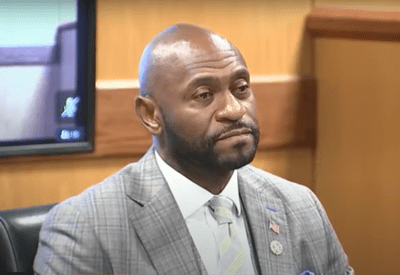
The city of Atlanta now boasts a unique organization in the state of Georgia, a citizen review board. The Atlanta Citizen Review Board is the only citizen review board in the entire state of Georgia and is acting as a layer of transparency between the public and Atlanta’s police and corrections officers. Rolling out spoke with the ACRB executive director Samuel Lee Reid about the controversial “Don’t Run” from police campaign.
The ACRB has a new campaign called “Don’t Run.” Please tell our readers about the program.
The thought behind the “Don’t Run” campaign is based on our investigative experience. In our office we have investigators who have come from different regions of the country with various backgrounds; what we have collectively seen is that sometimes when citizens run, it adds to some of the problems, including injuries and death. When we talk about the “Know Your Rights” campaign, then “Don’t Run” is a part of that campaign. Because what we are trying to tell citizens is that you don’t have to run, assert your rights. If the officer does something he should not do, then report it. Don’t be afraid to report, if you report it we can take the actions needed on the ACRB.
There’s an old saying “running will not save you” and we want people to know you don’t have to run. We find that in a lot of the cases we have seen the reason for running is trivial. But now the situation has gone out of control when you run. If a person takes off running, then the police will take off running too. This is something that we realize that we need to tell the citizens. Just try not to run and deal with what’s happening.
That’s the whole thing, try not to run? Is it ever OK to run from a cop?
When we kicked off this campaign some people said we have a constitutional right to run. That’s the assumption that you knew that it was a legal or illegal stop or not. If you don’t know if it’s a legal stop and you flee, then you have escalated the situation.
Let’s be realistic when it comes to asserting your rights. You can go on the Internet and see numerous videos of White people asserting their rights and nothing happens to them. The officers in a majority of the videos back off from the encounter. But when it comes to Black people doing the same type of thing, we are risking jail.
That’s true and part of the message we have to talk to citizens about is that sometimes depending on the officer you’re dealing with, there is going to be a cost when you assert your rights. The second piece of asserting your rights is making sure you file a report about the incident. Because if a guy is giving you a ticket or wants to take you to jail because you questioned them, that needs to be dealt with. People have taken advantage of us as a community because of our lack of knowledge and our fear of “if I say something.” Sometimes it seems that unless there’s pure outrage we won’t say anything.
If we want to start seeing a change we have to have people who are willing to say “Wait a minute. You can’t treat me like this. and if you do I know what to do about it.” But the second part of this is, one, making sure that the agencies that do the investigation are held accountable; and two, make sure that we let people understand what is going what is going on in the community. We need to hold elected officials accountable also. When a person is running for political office in our community we must ask them the hard questions: position on holding officers accountable; citizens rights vs. police rights.
Do cops like the ACRB? Why or why not?
The officers I have spoken to acknowledge why the ACRB exists and seem to be accepting of the organization. There was a lot of distrust initially but this is something that the citizens said they want.
Let’s talk about the case of Alexia Christian. Her family has been very vocal and appeared before your board. Her sister gave an impassioned plea for the video to be released and was to put it mildly upset over the lack of response from the ACRB. Can you tell our readers what steps you’re taking to help bring closure to the family of Alexia?
The way that meeting occurred it should not have occurred. After that meeting, though, we sent out a press release expressing our concerns about the meeting and our apologies regarding the way the whole incident unfolded. Also during that meeting one of the investigators did accept the complaint from the family. The goal of the ACRB is that every citizen should feel comfortable, respected and of value when they come to a board meeting or to our offices. That their concerns will be addressed in a way that is professional and instills confidence in them and the agency. That’s what we strive to do and we hope we do not have a negative encounter again.
What about the Cleveland case where officers shot the couple 136 times. Only one officer faced charges. When you hear stories like that as director of the ACRB what goes through your mind?
What goes through my mind is it’s tough. The reason why it’s tough is you know that these situations could be avoided and not taken to the extremes they are taken to. And then on the other side the way things are set up, you know that getting a conviction is going to be difficult, getting closure for the family is going to be difficult. Does that mean that we stop pressing against the wall? No. As an agency that’s involved in this you feel like your banging your head against the wall but you have to keep banging it. Because at some point you hope it will wake up citizens, officials and police.
















